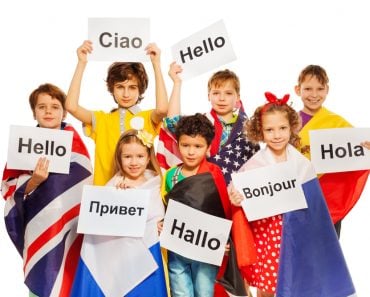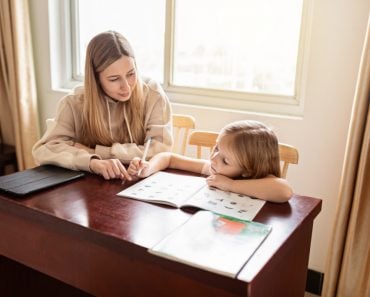Table of Contents (click to expand)
Children develop their language skills at different times and through different avenues, but the progress is typically linear, with complete sentences being a more advanced form of language that requires a rudimentary understanding of diverse morphemes, as well as grammar and its purpose.
If you’ve ever had a child, played with your nephews, or struck up a conversation with a friend’s toddlers at a birthday party, you probably realized that young children don’t have the same mastery of language as the other adults in your life. In fact, many young children and toddlers communicate their desires with gestures, monosyllabic tones, or brief phrases of 2 words. Our more developed adult brains can then typically decipher those desires or requests. However, in many cases, toddlers seem to understand longer and more complex questions or directions from adults, yet they won’t reply in full sentences—why is that?
Recommended Video for you:
Language Development In Children
It doesn’t take long for young children to begin unraveling the mystery of language long before they are able to speak. Studies have found that even in the first year, children are able to recognize and react to speech in their native language, identify the differences in phonetic sounds, as well as breaks in fluid speech. In combination with their other senses, and their word-object associations, pre-speech children are developing an ability and an understanding. It has been shown that children will react to videos of “mommy” and “daddy” when prompted with the matching word, but will not react to the images of other individuals.
Developing word-object, novel-label and novel-object linkages before reaching the one-year mark, pre-speech children are building a foundation of associations that will be supported and validated once they do begin to form meaningful speech. Most children will say their first word between the ages of 10-14 months, and the one-year mark is usually associated with 2-3 basic words (e.g., mama, dada, cat, etc.).
Between the ages of 1 and 2, language can develop rapidly, but if it doesn’t, it shouldn’t me a major concern, provided your child is generating a lot of noise (even gibberish), using gestures, and responding to your directions, such as stopping their behavior when hearing the word “no”. It is important to remember that there is a wide spectrum of language development in children, not a right and wrong path.
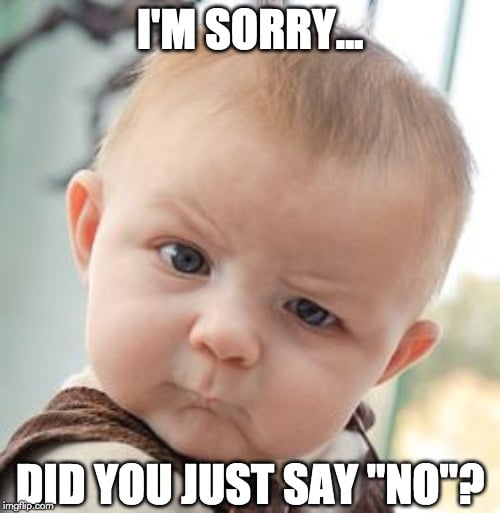
On average, language learning and use will increase rapidly around 18 months, expanding from parts of the body, mama/dada, and very familiar objects/pets to new objects, some of which will be further away from their immediate presence or line of sight. Between 18 months and 2 years, a child’s vocabulary could expand to 50 words or more, including their own name. By a child’s second birthday, it isn’t unusual for them to be using 2-word phrases, such as “I go” or “daddy car” to signify relationships between subject and action. Some babble and nonsense words will still be in daily use, but they will be shifting to primarily “real” words by this point in their development.
Between the ages of 2 and 3, a child’s vocabulary will typically grow from 50 words to ~200 words or more, accompanied by much more comprehension of what is being said to them. Also, the number of morphemes (significant sentence parts) they use will grow to 3 or 4. For example, at age 2, a child might say “Daddy car” (2 morphemes), whereas at age 3, that same thought might be expressed as “Daddy in the car” (4 morphemes).
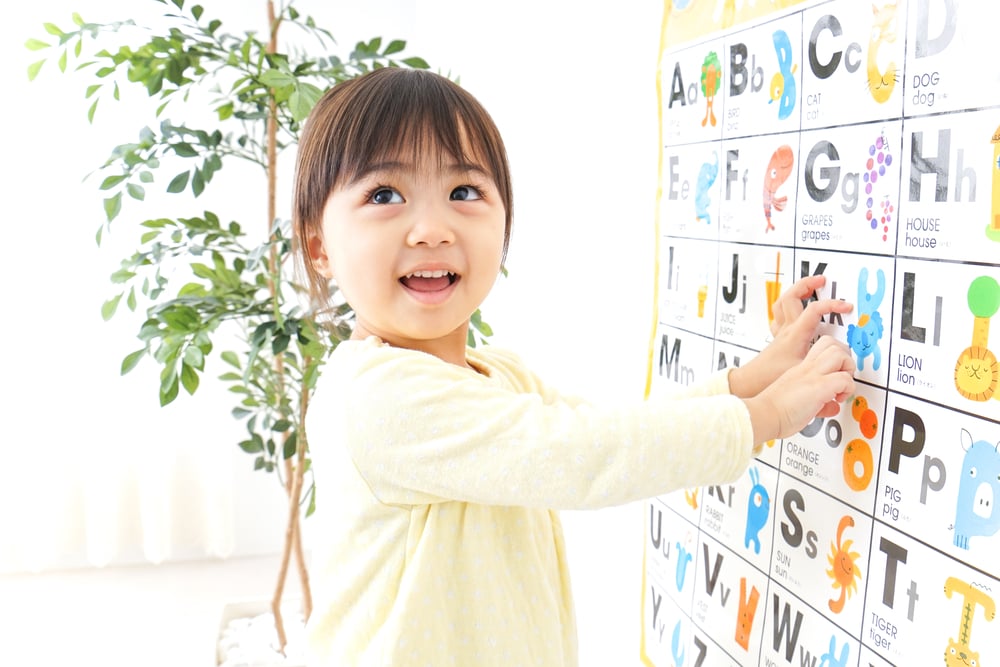
Language mastery will increase between the ages of 3 and 4 in most children, with vocabulary growing to nearly 500 words, and sentence construction of 5-6 morphemes, along with the ability to differentiate between different parts of speech, including action words and tenses. They may not be able to use these nuanced words correctly in their own talking, but they can comprehend these more complex sentence styles. By age 4, most children are able to speak in complete sentences.
As you can see from this progression of expected milestones, the mastery of language is a gradual process, and these specific temporal milestones represent the average that is typically seen at these points. Toddlers aged 2 and 3 don’t speak in full sentences because they are able to express their meaning and achieve their goals with fewer words. Parents decipher children’s wants and needs as best they can throughout this period of rapid brain development, while children listen, learn and absorb the linguistic behavior around them.
Through trial and error, coupled with regular practice, conversation and reading, toddlers grow into their language skills at their own pace. That being said, there are a number of factors that can affect language development and progress. If you feel as though your child may not be advancing at a healthy or proper level, you may consider some of the causes outlined below.
Factors That Affect Language Development
Like so many other elements of childhood development, there are myriad factors that can affect language development in a child, including intentional support and practice, socializing with other children, reading, educational playtime, communication disorders and environmental factors.
Support/Practice – One of the most important things you can do with your child is practice communicating! Baby talk may be appropriate for a few months, but the sooner you can start communicating in full, simple sentences, the quicker your child will begin to learn and emulate your speech. Additionally, when your child does begin to utter their first words, look at everything as a learning opportunity. Identifying objects on the street to increase association, encouraging them to combine words into phrases, and having them repeat words aloud will help language become a constant in their lives. For example, if your child says, “Daddy car”, prompt them by replying, “Daddy is in the car”.

Always make your encouragement positive and progressive; rather than telling them they made a mistake, have them try again or repeat the phrase back to you as best they can. Positive reinforcement with reading, either to them, or by sounding out words together, will also keep the flow of learning smooth.
Socializing – Interacting with other children and toddlers can be very helpful for developing communication abilities. Joint playdates and time with friends is important to signify that communicating and interacting with others is a fun activity. Engaging with “peers” is also different than dealing with parents or siblings, further expanding your child’s idea of what language can be.
Educational Playtime – Although there is plenty of room for fun when raising a child, there are also countless opportunities for education. Storytelling, creating scenarios with different toys, and gentle prompting of vocabulary and language practice can make language a constant part of their day, whether they are playing and laughing or sitting in their high chair during dinner. It is known that play is closely related to language learning, as self-expression can appear more easily in a low-pressure, enjoyable setting. When a child is first getting a grip on the world, everything in their day and immediate surroundings is a chance to learn!
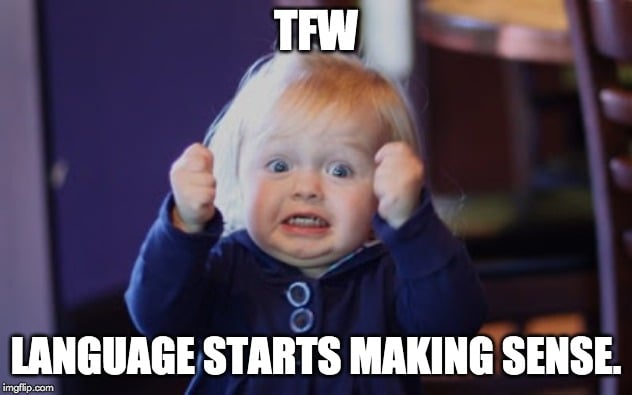
Environmental Factors – The domestic and cultural situation of a child will also affect their willingness and ability to speak. Children of divorced or separated parents, those who have experienced trauma/abuse, children without siblings, or those who are raised in isolation from other children or people aside from their parents, may show slower progress in language development than others. For example, a child who is growing up in the heart of an active city within a dynamic family and social structure may progress faster than a child living in a rural area with a single parent and a minimum of social interaction.
Communication Disorders – A delay in speaking is often an obvious sign to parents that something is wrong, but to reiterate one more time, children do develop at different rates, so be sure to speak with a professional before worrying! That being said, language delays are relatively common, and may be evidenced by clearly missing the milestones outlined above. Other symptoms may include not listening to directions, not talking by the age of two, struggles with sentence formation and comprehension, and poor pronunciation of basic words. The causes of these language delays may vary, from autism spectrum disorder or hearing disability to an intellectual disability or some form of trauma.
A Final Word
Watching your child grow up and develop the ability to communicate is a pure and constantly rewarding joy. However, in this modern age, parents often grow concerned when their child’s speech isn’t “keeping up with the Joneses”, so to speak. It is important to remember that there are many factors affecting a child’s ability to speak, some of which are beyond your control as a parent.
Development can happen in unpredictable waves, in fits and starts, so the best thing to do is provide consistent, engaged and positive support. If a serious delay is observed, then professional help can and should be sought. Fortunately, there is a huge range of effective therapies and strategies to overcome language disorders if your child needs extra help finding their way into the world of words.
References (click to expand)
- Tamis-LeMonda, C. S., & Bornstein, M. H. (1994, March). Specificity in mother-toddler language-play relations across the second year. Developmental Psychology. American Psychological Association (APA).
- Toddler speech development: What's typical for a 2-year-old? - kcms-prod-mcorg.mayo.edu
- Speech and Language Development | Michigan Medicine. mottchildren.org


